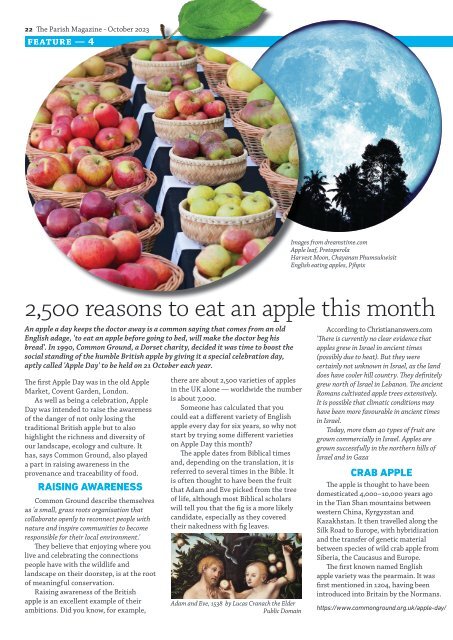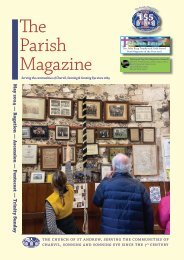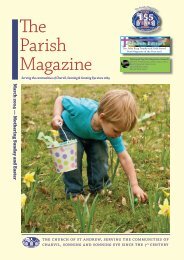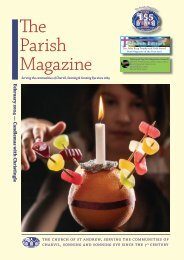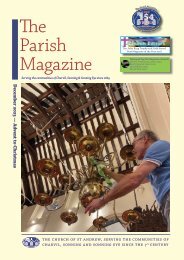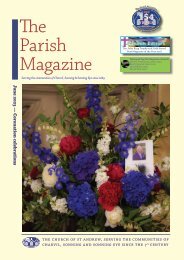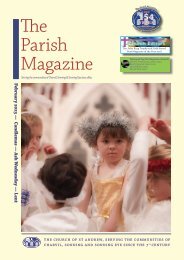The Parish Magazine October 2023
Serving the communities of Charvil, Sonning & Sonning Eye since 1869
Serving the communities of Charvil, Sonning & Sonning Eye since 1869
You also want an ePaper? Increase the reach of your titles
YUMPU automatically turns print PDFs into web optimized ePapers that Google loves.
22 <strong>The</strong> <strong>Parish</strong> <strong>Magazine</strong> - <strong>October</strong> <strong>2023</strong><br />
feature — 4<br />
Images from dreamstime.com<br />
Apple leaf, Pretoperola<br />
Harvest Moon, Chayanan Phumsukwisit<br />
English eating apples, Pjhpix<br />
2,500 reasons to eat an apple this month<br />
An apple a day keeps the doctor away is a common saying that comes from an old<br />
English adage, 'to eat an apple before going to bed, will make the doctor beg his<br />
bread'. In 1990, Common Ground, a Dorset charity, decided it was time to boost the<br />
social standing of the humble British apple by giving it a special celebration day,<br />
aptly called 'Apple Day' to be held on 21 <strong>October</strong> each year.<br />
<strong>The</strong> first Apple Day was in the old Apple<br />
Market, Covent Garden, London.<br />
As well as being a celebration, Apple<br />
Day was intended to raise the awareness<br />
of the danger of not only losing the<br />
traditional British apple but to also<br />
highlight the richness and diversity of<br />
our landscape, ecology and culture. It<br />
has, says Common Ground, also played<br />
a part in raising awareness in the<br />
provenance and traceability of food.<br />
RAISING AWARENESS<br />
Common Ground describe themselves<br />
as 'a small, grass roots organisation that<br />
collaborate openly to reconnect people with<br />
nature and inspire communities to become<br />
responsible for their local environment.'<br />
<strong>The</strong>y believe that enjoying where you<br />
live and celebrating the connections<br />
people have with the wildlife and<br />
landscape on their doorstep, is at the root<br />
of meaningful conservation.<br />
Raising awareness of the British<br />
apple is an excellent example of their<br />
ambitions. Did you know, for example,<br />
there are about 2,500 varieties of apples<br />
in the UK alone — worldwide the number<br />
is about 7,000.<br />
Someone has calculated that you<br />
could eat a different variety of English<br />
apple every day for six years, so why not<br />
start by trying some different varieties<br />
on Apple Day this month?<br />
<strong>The</strong> apple dates from Biblical times<br />
and, depending on the translation, it is<br />
referred to several times in the Bible. It<br />
is often thought to have been the fruit<br />
that Adam and Eve picked from the tree<br />
of life, although most Biblical scholars<br />
will tell you that the fig is a more likely<br />
candidate, especially as they covered<br />
their nakedness with fig leaves.<br />
Adam and Eve, 1538 by Lucas Cranach the Elder<br />
Public Domain<br />
According to Christiananswers.com<br />
'<strong>The</strong>re is currently no clear evidence that<br />
apples grew in Israel in ancient times<br />
(possibly due to heat). But they were<br />
certainly not unknown in Israel, as the land<br />
does have cooler hill country. <strong>The</strong>y definitely<br />
grew north of Israel in Lebanon. <strong>The</strong> ancient<br />
Romans cultivated apple trees extensively.<br />
It is possible that climatic conditions may<br />
have been more favourable in ancient times<br />
in Israel.<br />
Today, more than 40 types of fruit are<br />
grown commercially in Israel. Apples are<br />
grown successfully in the northern hills of<br />
Israel and in Gaza<br />
CRAB APPLE<br />
<strong>The</strong> apple is thought to have been<br />
domesticated 4,000–10,000 years ago<br />
in the Tian Shan mountains between<br />
western China, Kyrgyzstan and<br />
Kazakhstan. It then travelled along the<br />
Silk Road to Europe, with hybridization<br />
and the transfer of genetic material<br />
between species of wild crab apple from<br />
Siberia, the Caucasus and Europe.<br />
<strong>The</strong> first known named English<br />
apple variety was the pearmain. It was<br />
first mentioned in 1204, having been<br />
introduced into Britain by the Normans.<br />
https://www.commonground.org.uk/apple-day/


